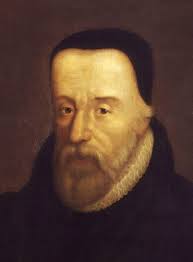Project Description
WILLIAM TYNDALE
Jack Greenald
William Tyndale was born in Gloucestershire in the early 1490s. He studied at Oxford, receiving his Bachelor’s and Master’s degrees. On 24 March 1515, Tyndale was ordained a deacon in St Paul’s Cathedral and on 7 April 1515 he was ordained priest “in the church of the Hospital of Saint Thomas Acon the martyr, in the City of London”. After spending a number of years studying in Oxford, Tyndale began further study at Cambridge.
Tyndale returned to his native Gloucestershire in 1521 and spent two years as tutor to the children of Sir John and Lady Walsh at Little Sodbury Manor. Here he began to translate the New Testament. Many clergy enjoyed the hospitality at Little Sodbury Manor, and Tyndale would debate theology with them. On one occasion, Tyndale’s quoting of the Word of God irritated a friar who said “We had better be without God’s laws than the Pope’s” Tyndale replied, “I defy the Pope and all his laws, and if God spare my life I will, before many years have passed, cause the boy that driveth the plough to know more of the Scriptures than you do”. Tyndale had concluded that “It is impossible to establish the lay people in any truth except the Scriptures be plainly laid before their eyes, in their mother tongue”.
Tyndale’s views and his preaching in the area around Bristol brought him to the attention of the Chancellor of the Bishop of Worcester, who warned Tyndale about his conduct. Soon after, Tyndale visited a friend who warned him, “Do you not know that the pope is very antichrist, whom the scripture speaketh of? But beware what you say: for if you shall be perceived to hold that opinion, it will cost you your life”.
Tyndale boarded a ship going to Hamburg, where he continued with his work and by late 1524 had completed the translation of the Gospels of Matthew and Mark. He spent some time in Wittenberg before travelling to Cologne in spring 1525, where he visited a printer and ordered 3,000 copies of the New Testament. The authorities became aware of the order and Tyndale had to rush to the printers, collect the sheets that had been printed and escape down the Rhine. He moved to Worms, where he met with another printer, and the first two editions of the English New Testament were completed by the end of 1525, when 1,500 copies were ready. By the end of 1526, six thousand Testaments were printed and ready to be sent into England.
The English authorities were watching every port to ensure that the Testaments would not come into the country. The Testaments were packed into cases, barrels and bales of merchandise, and sacks of flour and grain, and were smuggled into England. In four years, 15,000 copies were distributed throughout the country. By late August 1526, the flow of Tyndale Testaments into England was so great that an emergency meeting of bishops was held to address the problem.
At the end of October 1526, Bishop Tunstall issued a proclamation that all copies of the English New Testament were to be confiscated under pain of excommunication as suspicion of heresy. Tunstall preached a sermon at St Paul’s Cross denouncing the English New Testament, and following his sermon every copy of Tyndale’s translation that had been seized was burnt. Cardinal Campeggio wrote from Rome on 21 November that he was pleased to hear of the burning of “the sacred codex of the Bible, perverted in the vernacular tongue and brought into the realm by perfidious followers of the abominable Lutheran sect: than which assuredly no holocaust could more pleasing to Almighty God”.
With profits to be made from the sale of English New Testaments, pirate copies were printed in Antwerp and began arriving in England in November 1526. To stop the spread of Tyndale’s Testament, Archbishop Warham began buying any copy he could acquire and burning them. Tyndale used the funds to pay for the printing of a revised Edition.
From Worms, Tyndale moved to Marburg and then spent two years 1533-35 in Antwerp. Here he was betrayed and arrested and spent sixteen months in prison in Vilvorde Castle. On 6 October 1536 he was strangled at the stake and then burnt. His final words were “Lord open the King of England’s eyes”. Within two years of Tyndale’s death, King Henry VIII issued a proclamation to place a Bible in the English language and every parish church.

